
-
 Lynx rally, stun Liberty in overtime in WNBA Finals opener
Lynx rally, stun Liberty in overtime in WNBA Finals opener
-
Pogacar hunting 'perfect' season finale with Coppi's Il Lombardia record

-
 'Soul of old Baghdad': city centre sees timid revival
'Soul of old Baghdad': city centre sees timid revival
-
Kittle at the double as Niners hold off Seahawks

-
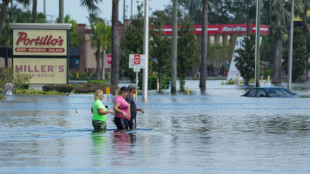 At least 11 dead in Florida but Hurricane Milton not as bad as feared
At least 11 dead in Florida but Hurricane Milton not as bad as feared
-
Yankees advance in MLB playoffs as Guardians stay alive

-
 Asian markets mixed after Wall St drop, Shanghai dips before briefing
Asian markets mixed after Wall St drop, Shanghai dips before briefing
-
Automaker Stellantis says CEO will retire in 2026

-
 Musk's promised robotaxi unveil delayed
Musk's promised robotaxi unveil delayed
-
Kamada says Japan can close in on World Cup place against Australia

-
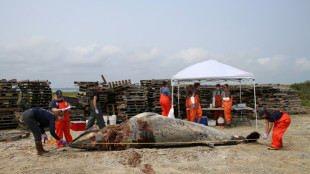 On US coast, wind power foes embrace 'Save the Whales' argument
On US coast, wind power foes embrace 'Save the Whales' argument
-
Renewables revolt in Sardinia, Italy's coal-fired island

-
 Argentina held, Brazil leave it late in 2026 World Cup qualifiers
Argentina held, Brazil leave it late in 2026 World Cup qualifiers
-
Obama blasts 'crazy' Trump in first rally for Harris

-
 2024 Nobel Peace Prize, a plea in favour of world order?
2024 Nobel Peace Prize, a plea in favour of world order?
-
Fry homers as Guardians down Tigers to stay alive in MLB playoffs

-
 Japan PM presses China's Li on airspace intrusion
Japan PM presses China's Li on airspace intrusion
-
In Trump 'Truths,' conspiracies, attacks -- and doubts about the election
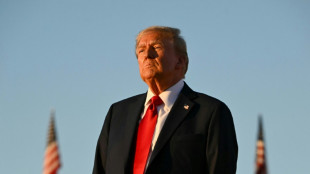
-
 How Sebastian Stan found a 'relatable' Trump for 'The Apprentice' biopic
How Sebastian Stan found a 'relatable' Trump for 'The Apprentice' biopic
-
Panama's water wheel trash collector keeps plastic at bay
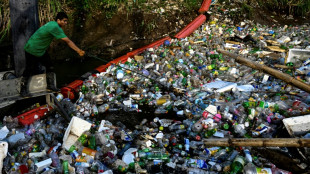
-
 It's still 'the economy, stupid,' says US political guru Carville
It's still 'the economy, stupid,' says US political guru Carville
-
Five key dates in the history of the America's Cup

-
 Zelensky to meet Pope, Scholz as whirlwind Europe tour ends
Zelensky to meet Pope, Scholz as whirlwind Europe tour ends
-
At least 10 dead in Florida but Hurricane Milton not as bad as feared

-
 Far from eye, Hurricane Milton's deadly tornados rampaged Florida
Far from eye, Hurricane Milton's deadly tornados rampaged Florida
-
At least 10 dead in Florida after Hurricane Milton spawns tornadoes
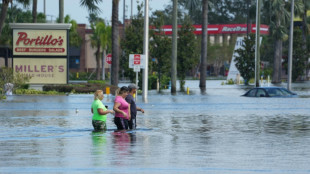
-
 Argentina held, Bolivia stun Colombia in 2026 qualifiers
Argentina held, Bolivia stun Colombia in 2026 qualifiers
-
Socceroos have 'nothing to fear' from Japan

-
 Sean 'Diddy' Combs sex trafficking trial set for May 2025
Sean 'Diddy' Combs sex trafficking trial set for May 2025
-
Bolivia stun Colombia in World Cup qualifiers

-
 Internet Archive reels from 'catastrophic' cyberattack, data breach
Internet Archive reels from 'catastrophic' cyberattack, data breach
-
Greece earn late win against England in Nations League, Italy-Belgium stalemate

-
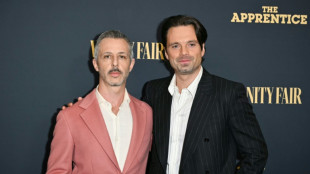 Trump biopic 'The Apprentice' hits US theaters weeks before election
Trump biopic 'The Apprentice' hits US theaters weeks before election
-
Pavlidis dedicates 'special' Greece win over England to tragic Baldock

-
 Wall Street stocks retreat from records on US inflation data
Wall Street stocks retreat from records on US inflation data
-
'Like a quake': Beirut shaken after deadliest strikes on centre

-
 Fallen giants Ghana in AFCON trouble after Sudan draw
Fallen giants Ghana in AFCON trouble after Sudan draw
-
Asian leaders meet in Laos with US, Russia on world turmoil

-
 England gamble backfires as Pavlidis fires emotional Greece to victory
England gamble backfires as Pavlidis fires emotional Greece to victory
-
Obama stumps for Harris, Trump talks US protectionism

-
 New-look France ease past Israel in Nations League
New-look France ease past Israel in Nations League
-
Belgium fight back to draw with 10-man Italy in Nations League

-
 'Get a life': Hurricane whips up US election storm
'Get a life': Hurricane whips up US election storm
-
Japan stay perfect in World Cup qualifying

-
 Relief as Lebanon evacuees dock in Turkey
Relief as Lebanon evacuees dock in Turkey
-
Lebanon says 22 dead in Israeli strikes on central Beirut

-
 NBA boss Silver sees games back in China 'at some point'
NBA boss Silver sees games back in China 'at some point'
-
Israel strikes central Beirut, killing 22

-
 Table tennis and Netflix push Ukraine teen into French Open contention
Table tennis and Netflix push Ukraine teen into French Open contention
-
Civilians flee Gaza's Jabalia in tightening Israeli siege


Five key dates in the history of the America's Cup
With the America's Cup due to get underway on Saturday in Barcelona, with holder Emirates Team New Zealand up against British challengers Ineos Britannia, AFP looks back at five key dates in the history of the oldest international competition still operating in any sport.
- 1851: The RYS £100 Cup -
The Royal Yacht Squadron first hosted the challenge putting up 15 yachts to take on New York Yacht Club's America in a fleet race around the Isle of Wight off the south coast of England.
Queen Victoria and the future Edward VII turned up on August 22, 1851 to watch America, captained by Richard Brown, overcome a broken jib boom to come home 18 minutes before the second boat.
The RYS £100 Cup was renamed the America's Cup in honour of the winner although fans often refer to it as The Auld Mug.
- 1870: First defence -
The owners of America, who soon sold the boat, held on to the trophy until 1857 when it was donated to the New York Yacht Club with a 'deed of gift', a strict set of rules to govern future races.
The NYYC issued an invitation for challenges later that year but it was not until 1870 that James Ashbury, representing the Royal Thames Yacht Club, took it up.
Eighteen yachts took part in a fleet race with Franklin Osgood's Magic comfortably seeing off Ashbury's Cambria. The Cup would stay in New York until 1983.
- 1970: Multiple challenge -
Until 1970, there had been a single challenger but that changed when Australia, Britain, Greece and France all issued separate challenges.
After the French got lost in the fog, it was Frank Packer's Australian boat Gretel II that emerged as the challenger to Intrepid, skippered by Bill Ficker. The idea of a challenger series - manifested today in the Louis Vuitton Cup - became the norm.
The America's Cup itself was a prickly contest, marred by protests and some would say sharp practice, which ended with a 3-1 win for the Americans and Packer insisting: "Protesting to the New York Yacht Club is like complaining to your mother-in-law about your wife."
- 1983: End of an era -
The Australians continued to be the main threat to the Americans with boats backed by businessman Alan Bond losing in 1974, 1977 and 1980, each time learning a little bit more about how to win.
In 1983, flying the pennant of the Royal Perth Yacht Club, he financed Australia II with its revolutionary and secretive winged keel in an another acrimonious series against Dennis Conner's Liberty.
With some outstanding tactical racing, Conner had opened up a 3-1 lead and needed just one more to retain the cup. But Australia II, skippered by John Bertrand, hit back to win the next two races and set up 'The Race of the Century'.
On September 24, 1983 Bertrand steered Australia II across the finish line 41 seconds ahead of Liberty, becoming the first successful challenger in 132 years.
- 1988: David v Goliath -
The first time New Zealand 'won' the America's Cup was in 1988 when the Mercury Bay Boating Club, based out of the back of a car, challenged San Diego Yacht Club.
The challege had been made under the 'deed of gifts' rule dating back to 1852 and the courts ordered San Diego, who initially rejected it, to accept.
On the water Stars & Stripes H3, with Dennis Conner once again at the helm, won easily with their catamaran outclassing Mercury's KZ-1 monohull.
The courts ruled, however, that it was a gross mismatch and not in the spirit of friendly competition, awarding the cup to New Zealand. On appeal, however, that decision was overturned and the cup stayed in San Diego.
New Zealand had their revenge in 1995 when Peter Blake's Black Magic trounced Conner's Young America 5-0 to take the cup back down under.
D.Schneider--BTB
